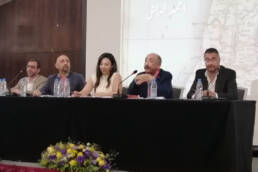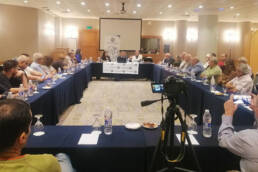[wonderplugin_carousel id=”16″]
The Center for Arab Unity Studies held a seminar on the “Lebanese Protests: the roots of the crisis and the prospects for a solution” at its headquarters in Beirut at noon Thursday, January 9, 2020, in the presence of a group of researchers, academics and media professionals.
The panel discussion was presented by the researcher at the Center Dr. Obada Kassar, and was moderated by the Director-General Mrs. Luna Abu-Swaireh.
The discussions of the seminar, which lasted for three consecutive hours, focused on finding solutions for the political, economic and social crisis prevailing in Lebanon today. The discussions were mainly based on a set of problematic questions about the location of Lebanon and its role today in the regional and international environment in light of the complexities of the regional scene, and how it is possible to move Lebanon to a system that transcends identity conflicts, especially sectarianism, and what is the form of the system required to enhance the choice of resistance in light of the Israeli aggressions and threats to Lebanon and the region, as well as the need for the Lebanese economy to shift from a rentier consumer economy to a productive economy free from the interests of the commercial-banking capitalist class allied with the leaders of the sects, and the need to transform the current state into a state Fostering democracy, social justice, equality and equal opportunities for its citizens.
The panelists agreed on the seriousness of the crisis and agreed that the country may collapse if everyone didn’t bare responsibility to find possible solutions, because we do not have the luxury of time. The attendees also stressed the need for accountability and transparency and work to develop mechanisms and tools to transform the Lebanese economy into a civilian economy far from quotas. The participants also saw that the movements or protests are unable to achieve the desired change if the people don’t agree on one vision regarding solutions for political, economic and living problems, as well as, Lebanon’s regional and international role and the stance on the conflict with the Zionist enemy. The participants also called on the various national powers to find common ground to form a lever that addresses the current crisis and fortifies Lebanon internally and externally.
مركز دراسات الوحدة العربية
فكرة تأسيس مركز للدراسات من جانب نخبة واسعة من المثقفين العرب في سبعينيات القرن الماضي كمشروع فكري وبحثي متخصص في قضايا الوحدة العربية
We appreciate your support
SUPPORT THE CENTRE FOR ARAB UNITY STUDIES
The Centre is reaching out for its friends and readers for support, whether by ordering our publications and paying for them in hard currency, or through donations. The Centre welcomes any support to boost its resiliency, to ensure its survival, the continuation of its legacy and its commitment to tackle issues facing the Arabs and the Arab world.



